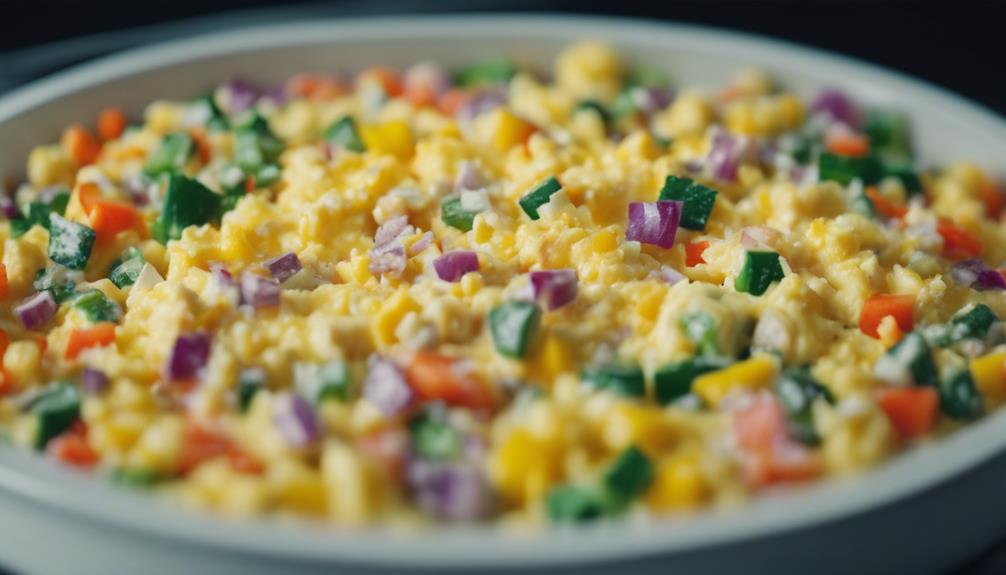Can You Microwave Eggs
Yes, you can microwave eggs without compromising their taste and texture. Microwaving eggs is a quick and convenient method of cooking them. However, it is important to follow a few guidelines to ensure the best results.
For scrambled eggs, beat the eggs with a little milk or water, season them, and cook them in short bursts, stirring in between, to prevent overcooking.
For poached eggs, crack an egg into a microwave-safe dish with a little water, cover it, and microwave it until the whites are set but the yolk is still runny.
Hard-boiled eggs can also be made in the microwave by piercing the shell and microwaving them for a few minutes. With proper techniques, microwaving eggs can yield delicious results in a fraction of the time.
Key Takeaways
- Microwaving eggs is safe and efficient with proper techniques.
- Customize dishes with add-ins like herbs, cheese, or spices.
- Adjust cooking times based on desired yolk consistency.
- Avoid common mistakes like overcooking and lack of milk for fluffy eggs.
Safety Precautions for Microwaving Eggs
When microwaving eggs, it is essential to adhere to safety precautions to prevent accidents and ensure a seamless cooking process. Using a microwave-safe bowl is crucial to avoid any potential hazards. By selecting a container specifically designed for microwave use, you reduce the risk of it melting or releasing harmful chemicals into your food.
This precaution ensures that your eggs cook evenly and safely without compromising your health. Additionally, always remember to pierce the yolks and whites with a fork before microwaving to prevent explosions. Following these safety measures when preparing your eggs in the microwave guarantees a smooth cooking experience and a delicious meal without any mishaps.
Different Methods to Microwave Eggs
Exploring various methods to microwave eggs offers quick egg preparation options. It emphasizes microwave egg safety practices and provides easy clean-up tips for a hassle-free cooking experience.
Quick Egg Preparation
Utilizing the microwave for quick egg preparation offers convenience and efficiency, especially when puncturing the yolks and whites before cooking. By piercing the eggs with a fork, you ensure they won't explode during heating.
Adjust cooking times based on your microwave's wattage for optimal results. It is crucial to use a microwave-safe container to prevent any mishaps.
For fluffy scrambled eggs, mix in a bit of milk and microwave in 30-second intervals until they reach the desired consistency. Additionally, get creative and personalize your microwave egg dish by incorporating ingredients like cheese or vegetables.
Experimenting with different add-ins can elevate the flavors of your quick and easy microwave eggs.
Microwave Egg Safety
To ensure safe and efficient microwave egg preparation, consider employing various methods such as poaching, scrambling, or baking eggs to achieve delectable results.
When cooking eggs in the microwave, it is essential to use a microwave-safe plate or container to prevent any mishaps. Ensure that you pierce the yolks and whites with a fork before cooking to avoid explosions.
Adjust the cooking times according to your microwave wattage to guarantee that the eggs are cooked properly. By following these guidelines and using proper containers, you can enjoy a variety of delicious egg dishes with ease and minimal cleanup.
Experiment with different methods to find your favorite way of preparing microwave eggs.
Easy Clean-Up Tips
When considering the preparation of microwave eggs for both safety and convenience, incorporating easy clean-up tips through proper container selection and cooking techniques is essential. To cook an egg in the microwave efficiently, use a microwave-safe container and pierce the yolks and whites before cooking to facilitate easy clean-up.
Adjust the cooking time according to your microwave wattage to prevent spills and splatters, reducing the mess. Allowing the cooked eggs to stand before removing any plastic wrap or lid can help avoid unnecessary messes. Additionally, consider using cooking spray or vegetable oil to prevent sticking and simplify the cleaning process.
Following specific cooking instructions for microwave eggs can minimize mess and streamline the clean-up procedure.
Ideal Cooking Times for Microwaved Eggs
For achieving varying levels of doneness in microwaved eggs, it is recommended to adjust the cooking time based on the wattage of your microwave. When aiming for hard-boiled eggs, follow these guidelines:
- Microwave a single egg for about 45-60 seconds for a soft yolk.
- Increase the cooking time to 1-1.5 minutes for a medium yolk.
- Microwave for 1.5-2 minutes for a hard yolk.
Always pierce the yolks and whites with a fork before microwaving. Use a microwave-safe container and allow the cooked egg to stand before removing the plastic wrap or lid.
Tips for Enhancing Flavor of Microwaved Eggs

Enhancing the flavor of microwaved eggs can be achieved by incorporating a variety of herbs, spices, and additional ingredients to elevate the overall taste profile of the dish. When preparing a microwaved egg, consider adding herbs such as chives, parsley, or dill for a fresh and aromatic kick.
Experimenting with ingredients like cheese, bacon, or sautéed veggies can add depth and richness to the one egg dish. Seasoning with spices like black pepper, paprika, or garlic powder will enhance the overall flavor profile.
Additionally, trying out different types of cheese such as cheddar, feta, or Swiss can bring a unique and delicious twist to your microwaved eggs. For a zesty touch, drizzle hot sauce, salsa, or top with avocado slices to elevate the taste experience.
Common Mistakes to Avoid When Microwaving Eggs
To ensure the optimal texture and flavor of microwaved eggs, it is essential to be mindful of common mistakes that can detract from the overall quality of the dish. Here are some key errors to avoid when microwaving eggs:
- Overcooking eggs can result in a rubbery texture.
- Stir eggs frequently for even cooking.
- Avoid using a high heat setting to prevent toughness.
- Adding milk is crucial for fluffy eggs.
- Adjust cooking time based on your microwave's power for perfectly cooked eggs in just two minutes.
Creative Egg Recipes for the Microwave

Using the microwave to prepare eggs offers a convenient and efficient way to create a variety of delicious and satisfying dishes.
Microwave poached eggs can be quickly made by combining an egg with water and vinegar in a bowl, then microwaving for 30 seconds.
For a simple meal, try microwave scrambled eggs by greasing a bowl, whisking eggs, microwaving for 30 seconds, adding cheese or veggies, and cooking until set.
Another option is microwave baked eggs: oil a bowl, add ingredients, crack an egg, season, cover with a plate, microwave in short intervals, and serve with desired toppings.
To achieve fluffy microwave scrambled eggs, mix eggs with milk and salt, heat in 30-second intervals, stirring until slightly soft.
Microwave eggs offer versatility, convenience, and quick cleanup.
Cleaning Tips for Microwaving Eggs
For efficient maintenance and upkeep of your microwave after cooking eggs, ensure to use a microwave-safe container and promptly clean any splatters or spills from the interior.
When microwaving eggs, follow these cleaning tips:
- Use a microwave-safe container to cook eggs safely.
- Wipe down the microwave interior after cooking eggs to remove any splatters or spills.
- Soak microwave-safe dishes with stuck-on egg residue in warm, soapy water for easier cleaning.
- Use a vinegar and water solution to clean and deodorize the microwave after cooking eggs.
- Regularly clean the microwave door seals and hinges to prevent odor buildup from cooking eggs.
Frequently Asked Questions
Are Microwaved Eggs Safe to Eat for Pregnant Women?
Egg safety is paramount for pregnant women. Ensuring eggs are thoroughly cooked, including microwaved eggs, is crucial to avoid salmonella. Pregnant women should follow food safety guidelines, cooking eggs until both yolks and whites are firm to prevent foodborne illnesses.
Can You Microwave Eggs in Their Shell?
Cooking microwave omelettes can provide a quick and convenient meal option. However, it is essential to avoid microwaving eggs in their shell to prevent explosions. Always follow safe cooking practices by cooking eggs out of their shells.
How Long Can You Store Leftover Microwaved Eggs in the Refrigerator?
When considering refrigerator storage for leftover microwaved eggs, it is recommended to store them for a maximum of 3-4 days in an airtight container after they have been thoroughly reheated. Prioritize food safety by discarding any eggs stored beyond this timeframe.
Can You Use Any Type of Microwave-Safe Dish to Cook Eggs in the Microwave?
When cooking eggs in the microwave, it is essential to use a suitable microwave-safe dish to ensure safe and effective results. Glass, ceramic, and certain plastic containers labeled as microwave-safe are appropriate choices for microwaving eggs.
Are There Any Health Risks Associated With Microwaving Eggs?
Microwaving eggs poses minimal health risks if cooked properly. However, individuals with egg allergies must exercise caution. Overcooking eggs in the microwave can lead to texture and nutrient loss. Always pierce yolks and whites before cooking for safety.
Conclusion
In conclusion, microwaving eggs can be a safe and efficient way to prepare a quick and nutritious meal. By following safety precautions, experimenting with different cooking methods, and adjusting cooking times accordingly, you can enjoy perfectly cooked eggs every time.
Remember to avoid common mistakes and explore creative egg recipes to add variety to your meals. With these tips in mind, you can easily elevate your microwave cooking skills and enjoy delicious eggs in no time.
